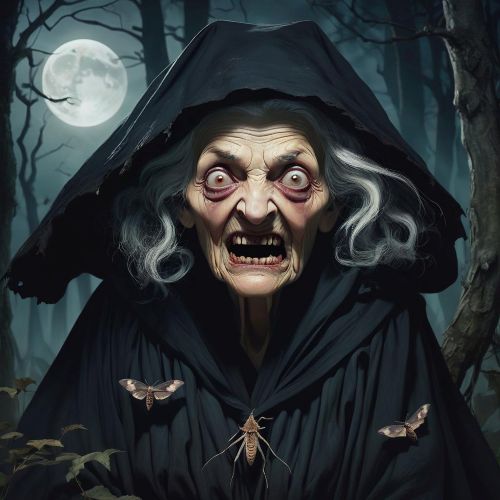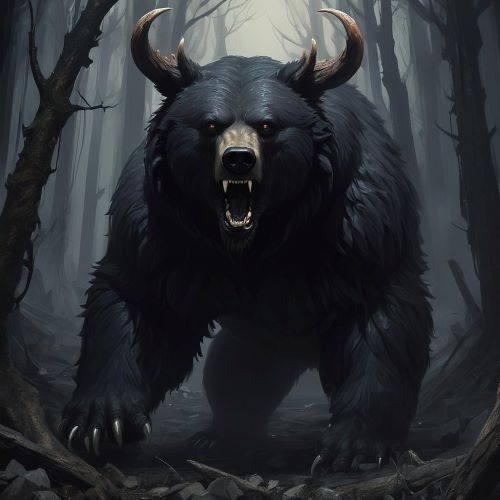Albanian Spirits
Albanian Spirits are central to the folklore and mythology of Albania, reflecting a worldview shaped by rugged mountains, dense forests, and centuries of cultural traditions. These spirits embody the mysterious and often unpredictable forces of nature, appearing in legends as guardians, helpers, or malevolent beings who challenge human courage and morality. Rooted in oral storytelling, their presence reveals how ancient Albanians understood the balance between the seen and unseen worlds, where every cave, river, or shadow might conceal a spirit with the power to alter human destiny. The mythology of Albanian Spirits is deeply interwoven with everyday life, guiding rituals, superstitions, and moral lessons passed down through generations.
One of the defining features of Albanian Spirits is their diversity, ranging from protective household beings to terrifying figures haunting wilderness areas. Many were believed to guard natural elements, ensuring fertility of the land and safety for families, while others tested the bravery of those who encountered them. These stories reflected the challenges of living in Albania’s rugged environment, where survival depended not only on strength and skill but also on respecting unseen powers. Some Albanian Spirits were linked to specific locations, such as mountains, springs, or bridges, making the landscape itself a living part of myth and legend.
The interaction between humans and Albanian Spirits often emphasized respect, caution, and ritual. Villagers told stories of spirits that could bless homes if honored properly, but bring disaster when ignored or offended. Offerings of food, water, or symbolic gestures were common ways to maintain harmony with these beings. At the same time, some spirits were viewed as dangerous tricksters or predators, requiring bravery or cunning to overcome. This duality captured the Albanian sense of life’s fragility, where fortune and misfortune often lay in the hands of supernatural forces. Through these narratives, the spirits reinforced cultural values of hospitality, respect for nature, and personal courage.
Albanian Spirits also played an important role in shaping national identity through folklore. Epic songs, fairy tales, and oral traditions kept their stories alive, blending pre-Christian beliefs with later influences from neighboring cultures and religions. While Christianity and Islam became dominant in Albania, the older traditions of spirits and supernatural beings never disappeared. Instead, they merged with newer beliefs, creating a rich spiritual tapestry unique to the region. Many of these spirits embody archetypes familiar across the Balkans but maintain distinctly Albanian characteristics, making them powerful symbols of cultural continuity and resilience.
In modern times, Albanian Spirits continue to inspire storytellers, researchers, and cultural revivalists. Folklore festivals, literature, and popular culture draw upon their imagery, ensuring that these ancient figures remain relevant. They serve not only as echoes of the past but also as reminders of the enduring connection between people, land, and spirit. For those exploring the myths of Albania, these spirits provide an unforgettable journey into a world where mountains whisper secrets, rivers hold hidden guardians, and every shadow may conceal a story waiting to be told.
Albanian Spirits are central to the folklore and mythology of Albania, reflecting a worldview shaped by rugged mountains, dense forests, and centuries of cultural traditions. These spirits embody the mysterious and often unpredictable forces of nature, appearing in legends as guardians, helpers, or malevolent beings who challenge human courage and morality. Rooted in oral storytelling, their presence reveals how ancient Albanians understood the balance between the seen and unseen worlds, where every cave, river, or shadow might conceal a spirit with the power to alter human destiny. The mythology of Albanian Spirits is deeply interwoven with everyday life, guiding rituals, superstitions, and moral lessons passed down through generations.
One of the defining features of Albanian Spirits is their diversity, ranging from protective household beings to terrifying figures haunting wilderness areas. Many were believed to guard natural elements, ensuring fertility of the land and safety for families, while others tested the bravery of those who encountered them. These stories reflected the challenges of living in Albania’s rugged environment, where survival depended not only on strength and skill but also on respecting unseen powers. Some Albanian Spirits were linked to specific locations, such as mountains, springs, or bridges, making the landscape itself a living part of myth and legend.
The interaction between humans and Albanian Spirits often emphasized respect, caution, and ritual. Villagers told stories of spirits that could bless homes if honored properly, but bring disaster when ignored or offended. Offerings of food, water, or symbolic gestures were common ways to maintain harmony with these beings. At the same time, some spirits were viewed as dangerous tricksters or predators, requiring bravery or cunning to overcome. This duality captured the Albanian sense of life’s fragility, where fortune and misfortune often lay in the hands of supernatural forces. Through these narratives, the spirits reinforced cultural values of hospitality, respect for nature, and personal courage.
Albanian Spirits also played an important role in shaping national identity through folklore. Epic songs, fairy tales, and oral traditions kept their stories alive, blending pre-Christian beliefs with later influences from neighboring cultures and religions. While Christianity and Islam became dominant in Albania, the older traditions of spirits and supernatural beings never disappeared. Instead, they merged with newer beliefs, creating a rich spiritual tapestry unique to the region. Many of these spirits embody archetypes familiar across the Balkans but maintain distinctly Albanian characteristics, making them powerful symbols of cultural continuity and resilience.
In modern times, Albanian Spirits continue to inspire storytellers, researchers, and cultural revivalists. Folklore festivals, literature, and popular culture draw upon their imagery, ensuring that these ancient figures remain relevant. They serve not only as echoes of the past but also as reminders of the enduring connection between people, land, and spirit. For those exploring the myths of Albania, these spirits provide an unforgettable journey into a world where mountains whisper secrets, rivers hold hidden guardians, and every shadow may conceal a story waiting to be told.



